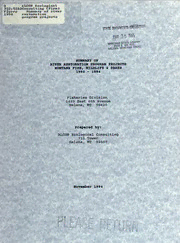
Summary of river restoration program projects : Montana Fish, Wildlife & Parks, 1990-1994 PDF
Preview Summary of river restoration program projects : Montana Fish, Wildlife & Parks, 1990-1994
S ALCON Ecoioeicai 333*9162Consultin£ (Firm) P2srrp Suromary of river 1994 restoration proeram projects DOCUMENTS COtttCTION STATE M 30 MAY UBRARV MONTANA STATE „ELESfM^0N\«B.62O SUMMARY OF RIVER RESTORATION PROGRAM PROJECTS MONTANA FISH, WILDLIFE 6 PARKS 1990 - 1994 Fisheries Division 1420 East 6th Avenue Helena, MT 59620 Prepared by: ALCON Ecological Consulting 713 Tower Helena, MT 59607 November 1994 MONTANASTATELIBRARY $13}.ai<2F2srTp1M4c1 Summaryofnverrestorationprogrampro 3 0864 00093767 CONTEMTS Page Program Summary 1 Project Descriptions 7 Appendix A - River Restoration Act Rules A-1 Appendix B - River Restoration Categorical Exclusions B-1 Appendix C - Grant Application Form C-1 ' ). I MONTANA FISH, WILDLIFE & PARKS Fisheries Division River Restoration Program 4!:>;.: Program Summary The River Restoration Program (RRP) was initiated by the 1989 Montana Legislature; they recognized that the conservation of rivers and their fisheries is of vital social and economic importance to Montana. House Bill 754 established a fund using license dollars and donations to help ensure that Montana rivers and streams will continue to provide high quality fishing to the State of Montana and its people. Rules were developed to administer the RRP in 1990 following standard public review procedures. The rules were approved by the Secretary of State and are found in the Administrative Rules of Montana, i.e., 17.7.1101 through 17.7.1112 (Appendix A). Additionally, rules were developed to categorically exclude certain RRP projects from the need to prepare an Environmental Assessment to meet the requirements of the Montana Environmental Policy Act. These rules (12.2.454) were approved by the Secretary of State in August, 1994 (Appendix B) The form presently used by applicants . seeking River Restoration Grants is included as Appendix C. Montana has two laws designed to protect and preserve rivers and streams in their natural or existing state. The Stream Protection Act of 1963 and the Natural Streambed and Land Preservation Act of 1975 require entities proposing projects that may physically alter or affect a river or stream to first obtain a permit that specifies measures required to protect the stream. Prior to initiation of these acts, projects were often designed without consideration for fish habitat and some blocked spawning migrations. Additionally, certain land management activities that occur near streams sometimes degrade river fish habitat. Such activities as subdivision development, livestock use, logging, dewatering and streamflow manipulations have all degraded fish habitat. The RRP provides reliable funding to restore fish and wildlife habitat through physical projects designed to improve rivers and their associated lands. The Department works cooperatively with individuals, landowners, private groups, conservation districts, and local, state and federal governmental agencies to implement specific river restoration projects. The RRP fund was established by earmarking fifty cents from each resident and one dollar from each non-resident fishing license sold. The program generates approximately $110,000 annually and to date has netted $556,453. Additionally, the 1993 Montana Legislature authorized the Department to budget $200,000 of federal aid dollars towards RRP projects. To date, applicants have been awarded $623,698 from the program. Table 1 siimmarizes program funding and activities for each fiscal year since inception of the program through November 1, 1994. TABLE 1. River Restoration Program Funding and Accounting Fiscal Year * ' ^.^h/^1 . ^-¥^ stabilization - 12; irrigation diversion modifications - 7; bank stabilization - 4; fish passage - 3; spawning channel - 1; and watershed restoration that involves a variety of treatments to improve fish habitat, water quality and land management - 3. Projects authorized for funding to date will have far reaching impacts on fish populations. When the 52 projects are completed, they will have directly enhanced fish habitat on 44.7 miles of rivers and streams. These projects will enhance spawning conditions and facilities, improve water quality, promote bank cover, reduce loss of fish to irrigation diversions and provide fish passage to spawning grounds. It is estimated that 141 miles of rivers and streams and three lakes will contain enhanced populations of fish as a result of the RRP. Of significance, these projects will be supplemented with over 1.2 million dollars of matching funds, grants, cost sharing and in-kind services. In several cases, the RRP funds were the catalyst needed to generate other sources of funds required to initiate projects. .1i.-* 1
